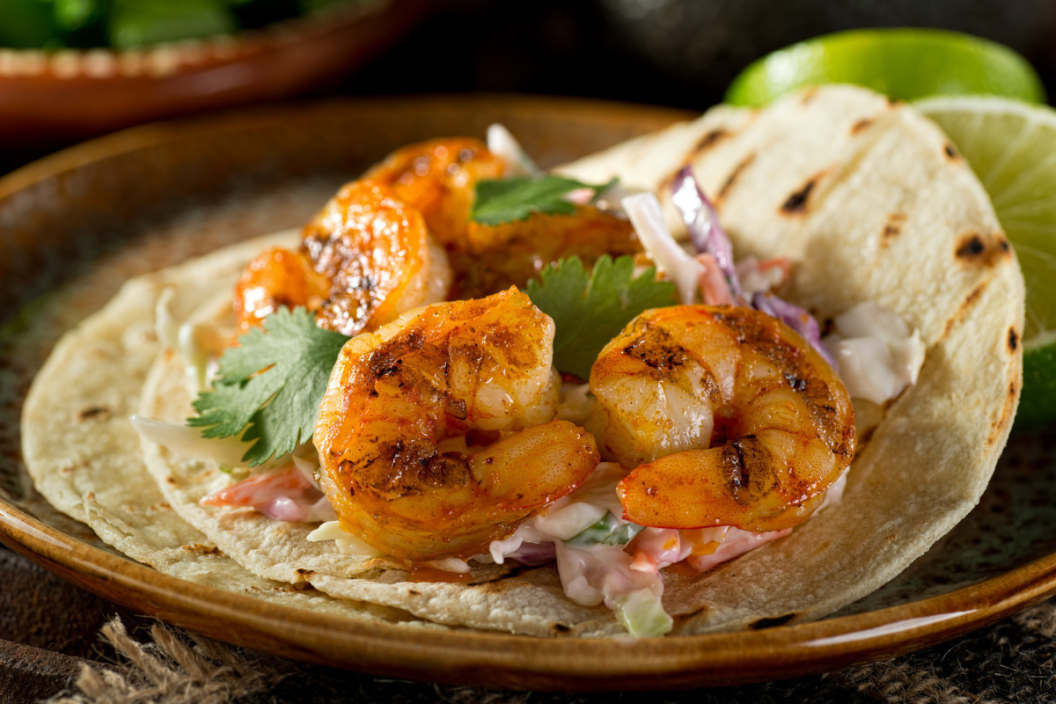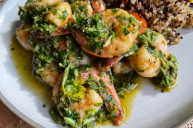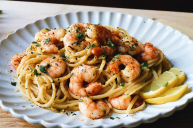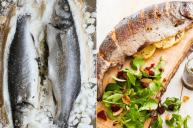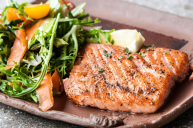A combination of oil, acid, and seasonings, a marinade can infuse a piece of meat or vegetable with vibrant flavor before it goes on the grill. Shrimp, for example, will easily absorb different flavors from a marinade, resulting in an engaging and elegant grilled dish. That said, it's important to tailor a marinade to suit the specific protein or veggie, and because shrimp is more delicate than beef, pork, or chicken, it needs a marinade that will heighten its natural taste without overwhelming it or compromising on texture.
Read on to find out how to create and use a grilled shrimp-friendly marinade.
The Best Fat-to-Acid Ratio for Shrimp Marinade
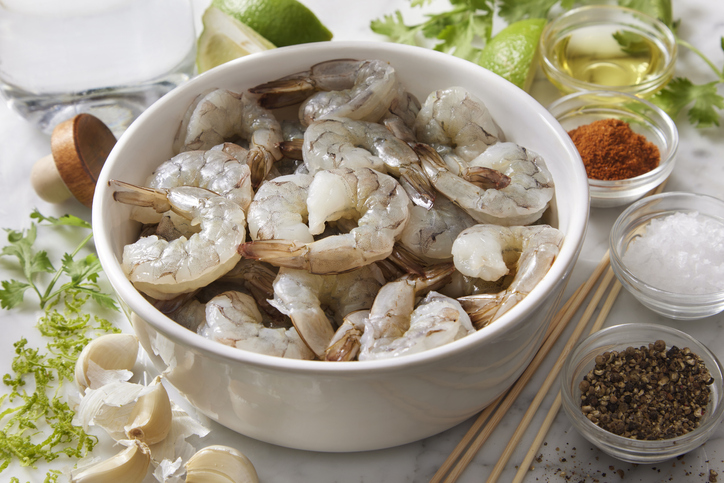
When we asked seafood chefs whether a "wet" marinade (a liquid version made with oil and acid) or a "dry" marinade (a rub of salt, sugar, and/or spices) is a better fit for grilled shrimp, the vast majority agreed that wet marinades are the way to go. "Most of the time, I use a dry marinade or a spice mix [for grilled food], but I use a liquid one for seafood," says chef and culinary instructor Yannick Tirbois of Culinary Ambition and Le Cordon Bleu.
To achieve a perfect fat-to-acid ratio for your marinade, follow this advice from executive chef Stephen Ennamorati of Next Door and Pazza on Porter in Boston, Massachusetts: "I like to add more oil than acid to my shrimp marinades and I generally use an 80:20 rule of 80 percent oil to 20 percent acidity." This ratio helps maintain the structure and texture of the shrimp; a high volume of acid can "affect the shrimp's texture. [Many] protein marinades are used to break down and tenderize the meat. With shrimp marinades, the goal is for them to maintain the shrimp's texture and to provide a nice snap of flavor for when you bite into the shrimp. " That's why he sticks to a simple marinade of oil, vinegar or citrus juice, and "aromatics. I use chive and rosemary when marinating shrimp." This straightforward marinade highlights the "beautiful natural flavors [of the shrimp,] which should not be masked."
Best Flavors For Marinating Grilled Shrimp
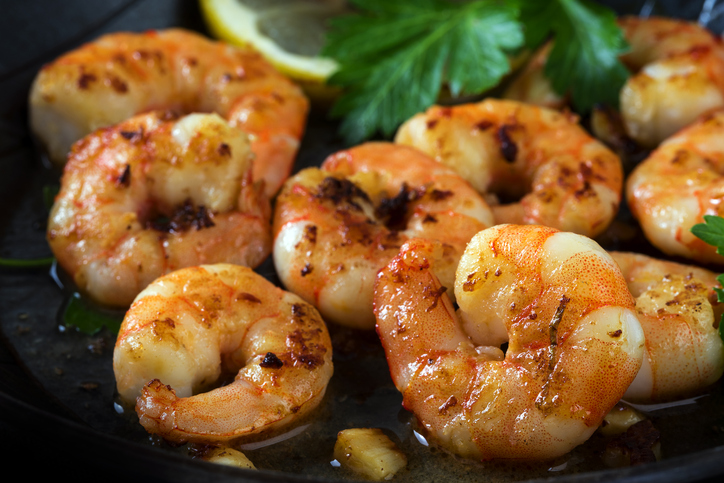
The sweet, briny, softly-savory flavor of shrimp is rightfully popular among seafood lovers, and its subtlety needs a gentle touch where seasonings and marinades are concerned. In fact, if you want to go full minimalist with your grilled shrimp, you can ditch the marinade altogether, as "shrimp are great on their own with a little sea salt and black pepper," according to recipe developer and cookbook author Stephanie Harris-Uyidi of The Posh Pescatarian.
But as far as liquid marinades go, chef and vice president of culinary operations Matt King of Smith & Wollensky tells us that, "in the case of shrimp, I would recommend citrus and your herbs and aromatics." Lemon juice or lime juice can serve as the acid component of the marinade, along with olive oil as the fat and any blend of spices, herbs, and alliums that you prefer. Ennamorati's blend of oil, citrus, chive, and rosemary is a prime example of this successful formula.
If you do want a shrimp marinade with bigger, bolder flavors, that's doable, as long as you use a measured hand and think carefully about how the ingredients will interact with the shrimp. Culinary director Greg Torrech of Atlantic Fish Company in Boston likes to add an extra level of savoriness to the shrimp by using "Worcestershire sauce, [which] gives sweet & sour undertones, or soy sauce. A soy sauce and lemon juice combination adds that [great] umami flavor."
For a fresh, herbaceous, and very summery marinade, "use chimichurri," suggests executive chef Horasio Selgado of Ceviche Tapas Bar & Restaurant in St. Petersburg, Florida. "Chimichurri as a marinade is great for shrimp. Chimichurri can be made with a variety of ingredients, such as parsley, cilantro, shallots, onion, lots of garlic, lime juice, red pepper flakes, salt , and olive oil."
Grilling Shrimp Tips & Tricks
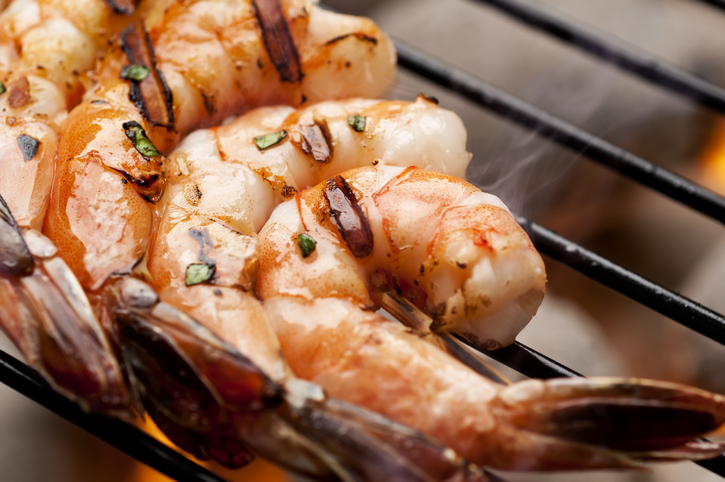
You don't need to marinate shrimp for nearly as long as you might think
If you're tempted to toss your shrimp into a marinade and keep it in the fridge overnight before grilling, it's time to reconsider those plans. King explains why from a scientific perspective: ""Shrimp contains a very high percentage of water and has a very open cell structure." For that reason, shrimp absorbs marinades extremely quickly. The issue there is that, as Ennamorati tells us, "the acidity in the marinade can 'cook' the shrimp if they are kept in it for too long."
Our experts generally recommend limiting the shrimp marinating time to 1 hour at the very most, but 15-30 minutes of marination will effectively season the shrimp without breaking down its structure. Or, if you want to play it really safe, try Ennamorati's preferred method of "tossing shrimp in a marinade as the grill is heating up, and as soon as the grill is hot enough, I put the shrimp on the grill."
Taste the marinade to ensure its flavor balance
Don't rely on measurements and assumptions when making your shrimp marinade. Instead, use your taste buds to determine whether the marinade suits your flavor preferences. "The biggest mistake that people make when marinating and seasoning shrimp is to overdo it. I prefer to maintain the natural flavors of the shrimp and supplement them with a marinade rather than hiding the shrimp's natural flavors with a marinade. The goal for seasoning is to bring out the protein's natural flavors. I recommend that people taste their marinades before adding the shrimp," says Ennamorati.
Take it easy with the salt
When applied judiciously, salt can beautifully accentuate the natural taste of shrimp. However, it's important to avoid applying salt with a heavy hand. "Shrimp have been swimming in the saltwater their whole lives, [so they] naturally have a salty taste to them. I'm not saying that you should avoid salt; just be careful with the amount you use," says executive chef Matthew Chaplin of Florence's Lowcountry Kitchen in Charleston, South Carolina. Remember: it's always possible to add more salt, but it's far more difficult to remove aggressive saltiness from a finished dish.
Consider replacing the marinating process with saucing after grilling
If you're nervous about overmarinating your grilled shrimp, think about "not marinating at all!" says chef/owner Vanda Asapahu of Ayara Thai in Los Angeles, California. Instead, use a simple salt-and-pepper seasoning (like the one recommended by Harris-Uyidi) and, after the shrimp comes off the grill, use a sauce to glaze the cooked shrimp or serve said sauce alongside the grilled shrimp as a dipping condiment. Asapahu likes to use a hot sauce made with Thai chiles and lime for this purpose, but you can also try cocktail sauce, garlic butter, chimichurri, or any other dipping sauce that you crave.
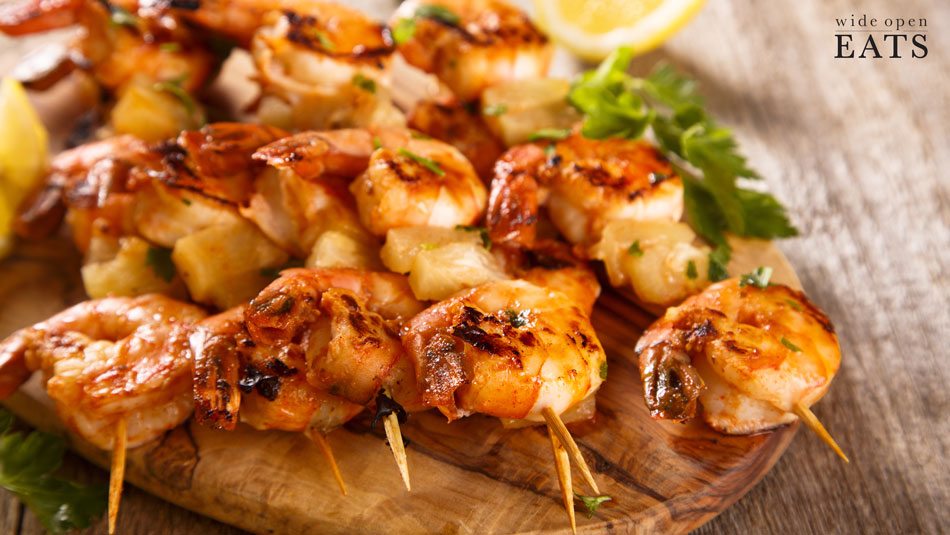
Spicy Grilled Shrimp and Pineapple Skewers
Ingredients
- 1 lb shrimp, peeled and deveined
- 20 oz canned pineapple chunks
- 3 tbs soy sauce
- 3 tbs honey
- 1 tbs hot sauce
Instructions
- Soak 10 to 12 wooden skewers in water for 15 minutes. This will prevent them from burning on the grill.
- Whisk together the soy sauce, honey, and hot sauce. Toss the shrimp in this mixture until evenly coated.
- Skewer the shrimp, with 2 to 3 pieces of pineapple between each.
- Lightly brush the grill with oil to prevent sticking. Grill 1 to 2 minutes per side, or until the shrimp turn pink and are slightly charred.
